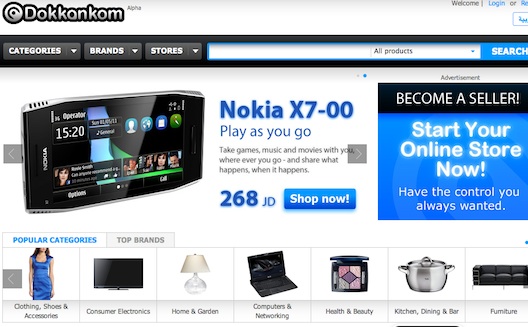Dokkankom Launches an eBay for the Middle East

 E-commerce site Dokkankom launched this weekend, bringing the region an eBay-like platform that allows vendors to create customized online stores.
E-commerce site Dokkankom launched this weekend, bringing the region an eBay-like platform that allows vendors to create customized online stores.
With the goal of bringing offline merchants online in the Middle East, the site offers hosted storefronts as an easy way for mom-and-pop shops to plug into an aggregated e-commerce community.
The site, which founder Anas Shanti began building in 2009, has launched in Jordan with one merchant thus far, Nokia and Dell reseller Mabco, while it aims to swiftly add more now that it's gone live. While Mabco is currently selling 50 Nokia products and will add Dell items soon, Dokkankom is hardly exclusive to electronics equipment; following the eBay model, it allows merchants to chose from 30-40 categories when posting items in their online stores. Unlike eBay however, it insists on fixed prices, not currently allowing auctions.
When it comes to payment gateways, which can be the bane of an e-commerce site's existence, Dokkankom has opted for international gateways, integrating with Moneybookers and PayPal, through a PayPal Jordan merchant account. While cash-on-delivery (COD) is now available, the other payment gateways will be deployed this week, allowing customers to use credit cards and debit cards. In the future, the site will also offer prepaid scratch cards, which Shanti says buyers love (buyers- do you love prepaid more than COD?).
The site offers Aramex as a logistics and COD solution, while also allowing vendors to login with their own Aramex accounts or provide their own shipping solution. In the future, Dokkankom plans to add UPS, DHL, and USPS as options, especially as it ramps up shipping to and from the U.S..
Convincing customers to use the platform won't be hard; the site has a sleek interface, and demand for online buying is on the rise in the region. Yet convincing vendors to come onboard will be what makes or breaks the site.
Dokkankom makes it simple for vendors to manage their own orders, inventory, customer database, and returns, yet educating vendors about the benefits of e-commerce, especially those who have never gone online, can prove tricky, says Shanti. "The biggest challenge is finding merchants. We have to change the way they think about things and show them that it's important to sell online."
While the site will force vendors to manage their own inventory, Dokkankom promises to build APIs for vendors looking to integrate with their platform more directly.
Shanti also insists that the aggregator model makes Dokkankom a second option for e-commerce retailers than a competitor. "We are not competing with anyone; we are simply enabling other e-commerce sites, as we are a marketplace, not a single store," he says. "[Jordanian e-commerce heavyweight] Souq.com or any other online retailer could easily list their products with us, as long as those products have fixed prices and are not sold by auction."
Yet the million dollar question is, does it make sense for either an existing e-tailer to open another online store and risk cannablizing their own traffic, or an offline shop to go on Dokkankom as opposed to building their own site, if they have to manage their own inventory updates and logistics integration?
For brands entering the region, like Ace Hardware, who has agreed to come on board as of yesterday, it might make the most sense; those who are already set up for global e-commerce may be looking for a simple way to enter the region. In fact, as Dokkankom expands to Dubai and Saudi Arabia, creating an avenue for U.S. merchants to sell to the Middle East is a priority, says Shanti.
Another big draw is the comparison shopping element, says Shanti. While the site right now only offers descriptions of products, and the "Add to Compare" function is still a bit clunky (I can't "Add to Compare" directly from a product page, only from an item search page), Shanti insists that in the future, Dokkankom will provide more direct listing of item specifications than eBay's visual comparisons.
Shanti is also hoping that seeing competitors on the site with comparable products will incite stores to go online: "We are hoping for a jealousy effect."
To build and launch the company, Shanti and his co-founder, lead technical developer Ahmad Saleh, funded the platform themselves while also taking on investment from Namek Zu'bi of Silicon Badia. Zu'bi took an 8% equity stake in exchange for the cost of a 3 month Silicon Badia training program that the Dokkankom founders underwent last October in Silicon Valley.
"The program allowed me to open my eyes in terms of how companies in the U.S. operate," says Shanti. "My goal was to identify my best go-to-market strategy."
It they succeed, they'll still have to compete with eBay for U.S. merchants, and compete with other e-commerce sites in the region for eyeballs and purchases. Although Shanti insists that Dokkankom could sell product databases to eBay or list products of other sites, the reality is that to compete, it will have to carve out its own niche of unique products that have not yet come to the Middle East market.
With DIA-style.com snapping up the luxury goods market, Rocket Internet darling Namshi taking on the mass-market fashion and beauty products sector, and Mizado (also Rocket Internet), Saletab and iPhady cornering the electronics markets, the race is on.


